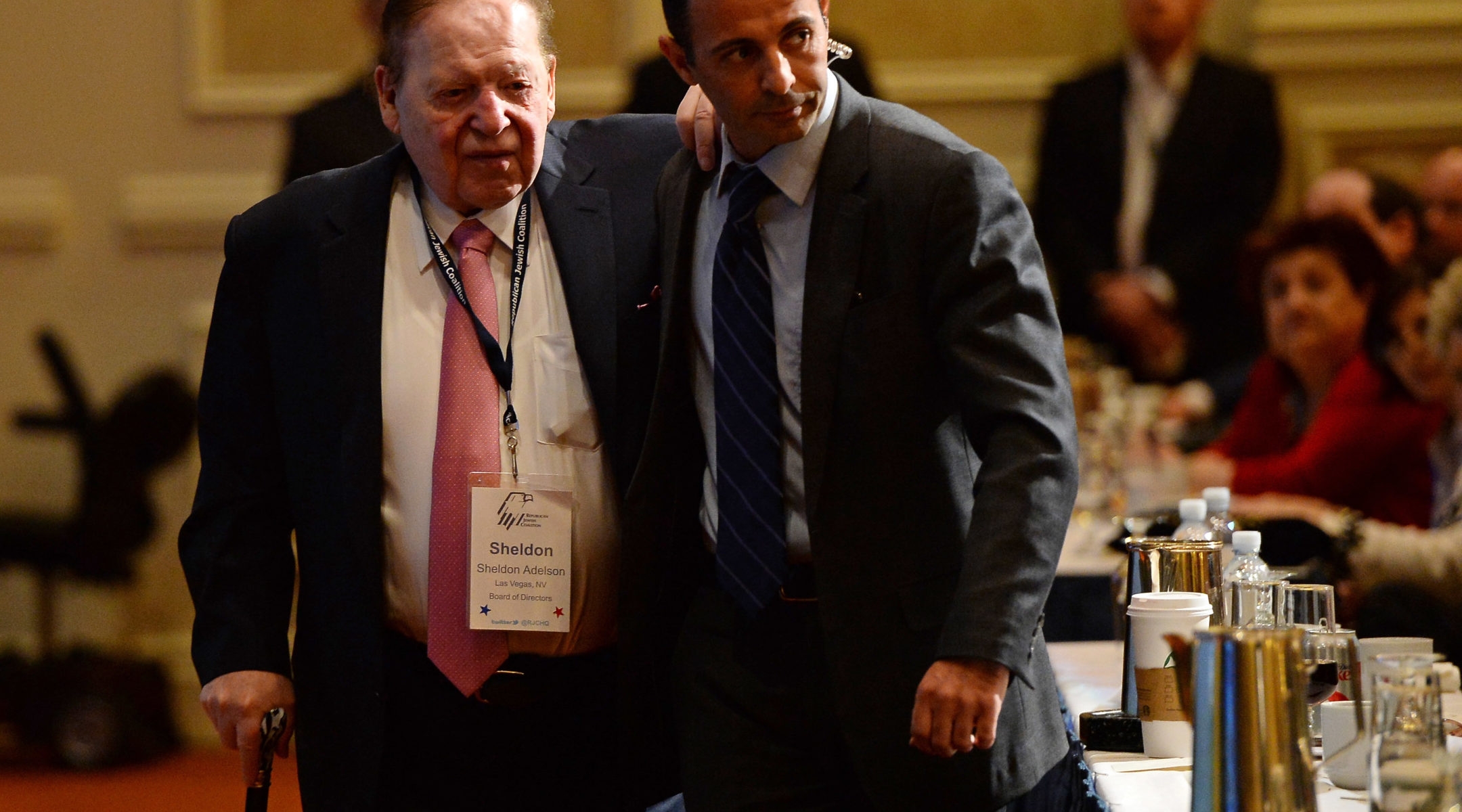TEL AVIV (JTA) — What happens when one man controls three major Israeli news outlets?
That’s the question Israeli media experts are asking just days after Sheldon Adelson, the American casino magnate and Republican mega-donor, purchased the respected conservative weekly Makor Rishon for nearly $5 million.
On Sunday, a Jerusalem court approved Adelson’s purchase of the paper, which had acquired the now-defunct Maariv newspaper and its website, NRG.co.il, in 2012. Adelson already owned Israel Hayom, a free daily tabloid he founded in 2007 that is Israel’s most widely distributed paper.
With the new purchase, Adelson now has control of Israel’s major right-wing media outlets, as well as two of the country’s four major newspapers.
“Adelson’s purchase of Makor Rishon is sad,” said Tehilla Shwartz Altshuler, head of the Israel Democracy Institute’s Media Reform Project. “It consolidates the media market, which is bad for content, but we shouldn’t mourn it. There are opportunities we haven’t seen yet.”
Adelson’s increasing hold on Israeli media has prompted concerns of increasing ideological conformity and less government criticism. A staunch supporter of Israeli Prime Minister Benjamin Netanyahu, Adelson is widely seen as having used Israel Hayom to increase popular support for the Israeli leader. Israeli Economy Minister Naftali Bennett, the chairman of the pro-settler Jewish Home party, likened Israel Hayom to Pravda, the state newspaper of the former Soviet Union.
“The paper is the trumpet of one man, the prime minister,” Bennett told Galei Tzahal, the Israel Defense Forces radio station. “At every intersection, every point of friction between the national interest and the prime minister’s interest, it chooses the prime minister’s side. I very much hope that Makor Rishon will maintain an independent, nationalist position. “
The CEO of the Las Vegas Sands Corp., with a net worth of more than $28 billion — the 11th richest American, according to Forbes magazine — Adelson has never been shy about using his wealth to advance his political interests.
In 2012, he was a generous supporter of the failed presidential campaign of Newt Gingrich. When Gingrich dropped out, Adelson threw his support behind Mitt Romney, the Republican nominee, donating $20 million to a Romney-supporting Super PAC.
Last week, a number of Republican presidential hopefuls gathered at Adelson’s Venetian hotel and casino in Las Vegas for what some were calling the “Sheldon primary” in recognition of the casino magnate’s power as a Republican kingmaker.
In Israel, there is little expectation that Adelson’s latest deal will augur the death of Israel’s free press. Israel’s other dailies — the centrist Yediot Acharonot and the left-wing Haaretz — are both critical of Netanyahu and remain widely read. Maariv, once Israel’s most popular paper, fell on hard times in recent years and ceased publication in March.
Still, some worry that Adelson’s purchase may narrow the parameters of public discussion. Last month, in an effort to maintain competition in Israel’s media market, Knesset members from seven parties — including the right-wing Jewish Home — proposed a law that would require readers to pay for Israel Hayom.
“There can be two right-wing papers that think differently,” said Tamir Sheafer, a professor of communications and journalism at Hebrew University. “There can be a right-wing paper that criticizes the prime minister from the right. But if Sheldon Adelson has a favorable attitude toward Netanyahu, will Makor Rishon criticize Netanyahu from the right?”
A Makor Rishon reporter who wished to remain anonymous acknowledged that political correspondents are “a little worried,” but said the Adelson deal will allow the staff to continue its in-depth reporting and analysis from a right-wing perspective.
“For us as journalists, it was very reassuring to know people like the paper and want to buy it,” the reporter said. “They see the importance of holding on to this type of paper. I would always joke that if I wrote the same article for Maariv and Makor Rishon, I would dumb it down for Maariv and keep it intellectual for Makor Rishon.”
The closing of Maariv, along with recent financial struggles at Haaretz and across Israel’s print media landscape, raise the question of whether a country of 8 million people can sustain four daily papers in the age of the Internet.
“The market in Israel is very small,” Altshuler said. “Its ability to sustain three papers or three TV stations, that’s something people don’t pay attention to. It was clear that one of them needed to close.”
Altshuler sees a potential boon for Israeli media in the growth of online journalism. But Tal Schneider, who writes the Plog, a well-respected Israeli political blog, says her work cannot replace the staff of a large newspaper.
“On my blog, we are not 100 reporters — we are a two-person business,” Schneider said. “We cannot provide the [same] extent of coverage. I cannot replace Maariv or Makor Rishon.”
Despite the worry, few see Adelson’s growing control of Israeli publications as an immediate threat to the country’s free press. But should the rise of digital media continue to erode the financial viability of traditional publications, that could change.
“I don’t think this specific deal will create irreparable damage,” said Sheafer. “But we need to make sure it doesn’t expand such that every media that gets into trouble goes to Sheldon Adelson.”
JTA has documented Jewish history in real-time for over a century. Keep our journalism strong by joining us in supporting independent, award-winning reporting.






